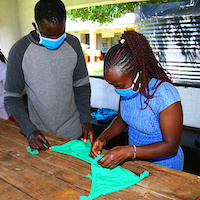A budget that keeps a promise?
27 September 2013
We’re a little over two weeks away from the next Irish budget. It’s probably a good time to be reminded (and to remind the government) of the report that came out in May: One World, One Future: Ireland’s Policy for International Development. Part of the argument of the paper is that the world has changed since 2006, when the White Paper on Irish Aid was published. And it is indeed true that Ireland, along with a number of countries in the EU, has had to adapt to a number of economic and financial constraints. It is also true (and those of you following the UN General Assembly debates and web page as well as this blog may be aware of this) that things have improved globally. While civil disruption, war and violence seem to continue unabated and garner a lot of headlines there has been, thanks partly to aid, progress in many areas that the media might find less exciting. Better sanitation, less extreme poverty, more drinking water; these alone can save - and have saved - millions of lives. But almost one billion people - one in seven of the world’s population - are still hungry today. So development aid helps but it is still needed. What should we do? There may well be good reason to strive for maximum impact and value for money from aid as the government report suggests, but maybe that should be the case whatever our input. And our input is something to be proud of. Our aid programme is internationally recognised as one of the best in the world. There is strong public support - including across political parties - for the aid programme. And people see in our aid programme a positive effect for Ireland. These three statements, incidentally, are also quotes from the report. Unfortunately, however, while the report insists that “the Government remains committed to achieving the target of 0.7% of Gross National Income allocated to international development cooperation, as stated in the Programme for Government”, it also suggests that it will move towards the 0.7% target “when our economy improves”. 2015 is only a short time away. Will our government’s promise to meet the United Nations target of contributing 0.7 per cent of GNP to overseas development assistance by the EU deadline of 2015 become a reality? Don't forget, a percentage of national income means that the real amount rises or falls with economic performance, so keeping to a set percentage does not mean keeping to a specific amount of euros. Falling below it, however, may cut our aid contribution not once but twice if our economic performance also declines. Our thanks to Act Now for 2015, which points this out and has a lot of useful information on how overseas aid works. We, of course, feel that the government should be aiming for 0.7 per cent by 2015 and that keeping our aid promise matters. If you feel the same way, don't forget the Act Now website and remind the government of its promise in the run-up to the next budget. And do have a look at the policy document itself.

